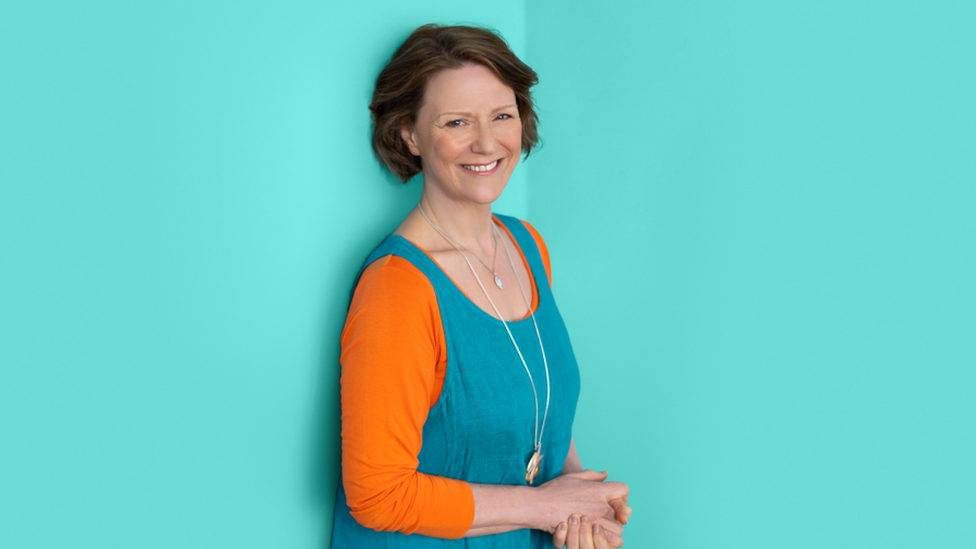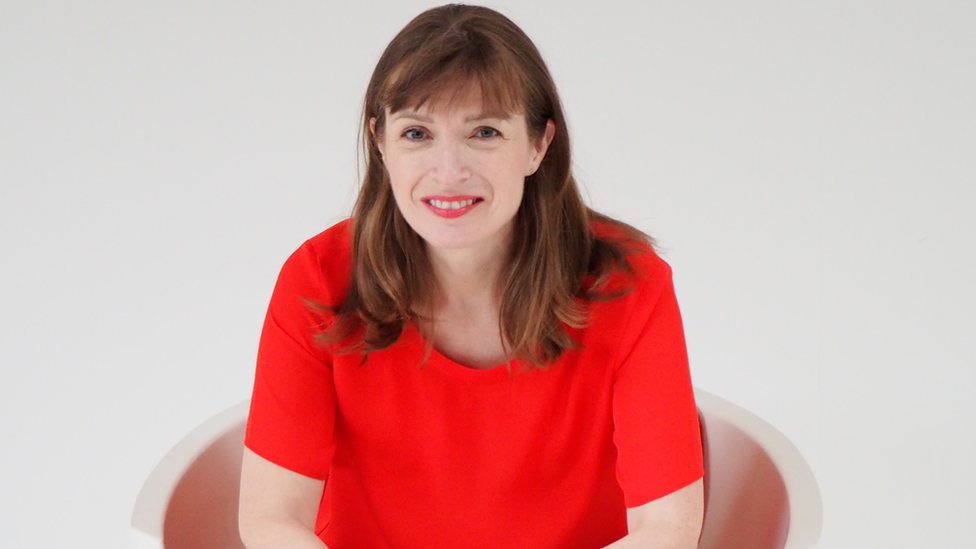Menopause and periods guidance is a 'magnificent step forward'
- Published

Lauren Chiren says she hopes the guidance will stop employers losing talented people
New guidance to support women with periods or going through menopause has been described as a "magnificent step forward".
The British Standards Institution (BSI) has published a workplace standard to tackle taboos and help employers keep talented people in work.
It suggests more training for managers and offering flexible work patterns.
It also recommends introducing comfortable seating and desk fans to help with menopause symptoms.
One woman who left her job due to early menopause said she thought at the time she would never work again.
About a decade ago, Lauren Chiren was working as a senior executive in financial services. She loved her job, was thriving on the challenge and enjoyed juggling work with being a new mum.
"That was until I found myself in meetings unable to get my words out," she said.
Ms Chiren initially thought her symptoms of sleep deprivation, forgetfulness and losing her self-confidence were signs of early dementia before she realised she was going through the menopause.
She chose to leave work and has since founded a menopause at work consultancy called Women of a Certain Stage.
The CEO from Bristol, who was on the panel that helped develop the new workplace standard, said she was delighted with the guidance and hoped it would prevent businesses losing talented people.
Ms Chiren said it was important to raise awareness and train line managers, adding that people did not talk about the menopause when she went through it.
She said the new work standard was a "magnificent step forward" and if organisations did not take it forward they risked getting "left behind".
The BSI is the UK's official standards body responsible for setting out the agreed way of doing things across a variety of industries.
Launching the new workplace standard, external, the BSI said "only a minority of UK workplaces" had already introduced policies on menstrual and menopausal health and wellbeing, stressing that some women, transgender men and non-binary people needed adjustments to effectively carry out their work.
These could include comfortable seating and desk fans, it suggests, as well as using non-stigmatising language like "menstrual products" instead of "feminine hygiene products".
The standard is intended to help workers in a variety of roles - including jobs that involve being on your feet a lot, like police officers, and highly physical roles like construction workers, the BSI said.
It said adjustments could be made to things like uniforms, PPE and artificial lighting.

What is the new standard?
The menstruation, menstrual health and menopause in the workplace standard, external sets out practical recommendations.
It is also intended to help companies identify misconceptions about periods and peri-menopause.
Suggestions include:
Increasing awareness of menstruation and menopause
Training managers to understand potential impact
Ensuring facilities are accessible
Checking if policies consider menstruation and menopause
Considering flexible work patterns for staff
Research from the Fawcett Society, a women's rights charity, suggested one in 10 women who worked during the menopause has left a job due to their symptoms, external.
The BSI said it recognised not everyone would want support as experiences differ.

Elysha Paige, who was also on the panel, said she previously felt she could not talk about her period and had to hide it at work.
She praised the accessibility of the guidance, adding that it was really good at recognising the shame and stigma that can exist in some work places.
Miss Paige runs an employers' programme for period awareness charity Bloody Good Period.
She said in a previous job she stayed on the contraceptive pill to control her periods to make her work life easier, "even though that wasn't the best thing for me and my mental health".
"I was the only woman and the only person who had periods," said the charity worker from London. She said if periods were discussed in the office, it was only ever in a degrading way.

Elysha Paige runs a programme to help employers understand how periods can impact people at work
It was a "rigid sales environment" where being away from your desk "was seen as a bad thing", said Miss Paige, adding that going to the toilet to change a sanitary pad would have been difficult.
But she said her experience was "definitely not one of the worst" and research from Bloody Good Period had found other people who were forced to take annual leave due to period problems.
Educating people in the workplace is important, says Tina Leslie from period poverty charity Freedom4Girls - but she wants the guidance to go further.
The charity worker, who has an MBE for services in tackling period poverty, wants policy changes made and for managers to adopt the standards set out by the BSI. One of the changes she would like to be made is free period products in workplace toilets, to help lower-paid workers access pads and tampons.

Rachel Lankester said there should be no stigma around asking for flexibility in the workplace
Fellow panellist Rachel Lankester said she was "absolutely delighted" with the new work standard, saying it would give organisations a framework to take action.
However, she said it was important that menopause and menstruation were "not seen as a medical conditions".
Women needed support, Ms Lankester said, but added "there is a fine line between giving women support and a reason for discrimination".
She said getting an early menopause diagnosis at 41 was "devastating".
"I didn't talk to anybody because I felt ashamed... but realised that was ridiculous," she said.
"If I'd known back then there was someone I could talk to… it would have made a real difference to my self esteem."
Ms Lankester, who has since founded Menoclarity and Magnificent Midlife to support women experiencing the menopause, said normalising the topic was "wonderful".
"I didn't have any information so I've created what I would have benefited from. I want women to have the correct information, to be prepared, not scared."
Additional reporting by Michael Sheils McNamee
- Published7 November 2024

- Published28 July 2022

- Published26 May 2023
